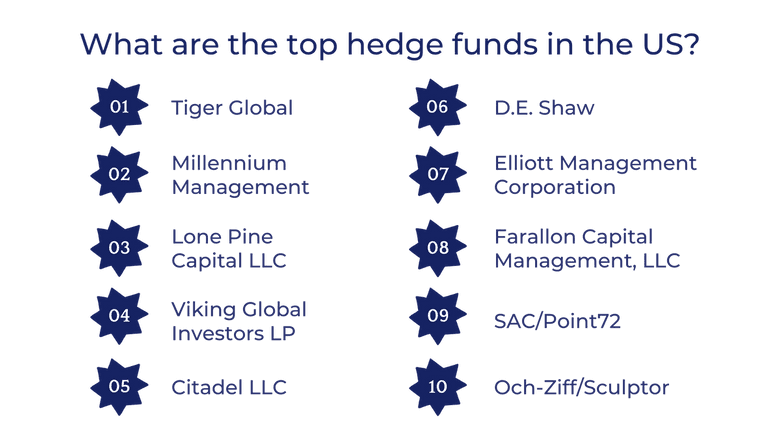Top Hedge Funds in the US by 2020 Profits
A look at the 10 hedge funds that gained over $60 billion for their investors in just one year.
Although only utilized by a select few, hedge funds manage a significant portion of the country’s wealth. According to Statista, hedge funds in the US alone managed over $3.8 trillion in 2020. However, despite their popularity as an alternative investment option, many of us don’t know exactly what hedge funds do with their investors’ money.
Let’s talk about how hedge funds operate and where they fit into the financial sector.
What Do Hedge Funds Do?

Simply put, hedge funds are actively managed investment portfolios aimed at generating returns for their investors. These firms typically receive a lot of leeway from regulating bodies to employ creative investing strategies. While mutual funds only sell stocks and bonds, hedge funds can also invest in land, real estate and commodities. This freedom allows them to maintain a portfolio that’s largely uncorrelated with the performance of the market.
In exchange for managing their investors’ money, hedge funds charge relatively high fees. The 2 and 20 compensation structure is standard in the industry, referring to an annual 2% management fee and a 20% cut of profits.
However, unlike more accessible investment vehicles, hedge funds are only available to select individuals and organizations. Per the Securities and Exchange Commission (SEC) restrictions, investors must have earned an income above $200,000 per year for the past two years. They should also have a net worth of over $1 million, excluding the value of their primary residence. Most hedge funds also require a high initial minimum investment, as well as other restrictions to limit their number of investors.
Hedge fund managers employ a wide variety of strategies in investing their clients’ money. Alfred Winslow Jones, founder of the first hedge fund in 1949, relied on the long-short equities strategy. As some may know, this method aims to reduce risk by buying stocks they expect to rise and short-selling stocks they expect to fall.
Since then, many other strategies have arisen, including:
- Merger arbitrage: stepping in during mergers and takeovers to buy shares in the target company and short-selling shares in the buying company
- Convertible arbitrage: buying convertible bonds and short-selling some of the shares into which they convert, while adjusting by buying/selling as the price fluctuates
- Short-only: identifying overpriced shares and short-selling them
- Quantitative analysis: using machine learning, data analysis and statistical modeling to make investment decisions
Why Do Hedge Funds Exist?

Hedge funds have gained their fair share of criticism over the years, especially at the start of 2021 with the concentrated efforts from Wall Street Bets to raise the price of stocks like GameStop and AMC. For many middle-class retail investors, hedge funds may seem like the corporate embodiment of a rich, elitist Wall Street investor. They’ve also been criticized for their high fees and low returns. Famously, hedge funds regularly underperform relative to index funds.
However, they can present significant benefits to their investors and the stock market. As previously mentioned, hedge funds can invest in a wide variety of assets. Depending on their strategies, they have the potential to produce returns completely independent of the market’s performance. For that reason, investors can benefit from putting a portion of their wealth into hedge funds to lower their risk in the event of a market downturn.
Some argue that hedge funds can have a positive effect on the economy as well. Because they make high volumes of investments, many argue that hedge funds provide liquidity to the market, lowering the cost of making trades. They also serve as a source of financing for up-and-coming industries, spurring innovation.
On the flip side, many argue that hedge funds short-selling stocks restore the balance by exposing undervalued assets. However, it’s hard to pinpoint exactly how much value hedge funds add, and the topic is still up for discussion.
Top Hedge Funds in the US

The 10 most profitable hedge funds in 2020 gained over $60 billion for their investors in just one year. Let’s talk about who they are.
1. Tiger Global
- Founder: Chase Coleman III
- Based in New York City, New York
- 2020 profits: $10.4 billion
Founded in 2001, Tiger Global is one of the youngest hedge funds at the top of the leaderboards these days. The firm was started by Chase Coleman III, a member of the New York elite and protégé, or “Tiger Cub,” of Tiger Management’s Julian Robertson. After working for Robertson as a technology analyst, Coleman was entrusted with a $25 million investment to start his own fund. Since then, it’s grown to be an internationally recognized company.
Tiger Global focuses mainly on technology companies, particularly those in the internet, software, consumer and fintech industries. In 2003, it launched a private equity branch, through which it targets growth-oriented private companies in the US, China and India.
2. Millennium Management
- Founder: Israel Englander
- Based in New York City, New York
- 2020 profits: $10.2 billion
- Assets under management: $295 billion
Although it’s been around for over 30 years, Millennium Management got off to a slow start. The firm actually underperformed after its launch in 1989, and co-founder Ronald Shear left after six months. However, it’s worked its way up over the years, growing to over 3,500 employees. In 2020, it posted its highest returns since 2000 and hired 70 new teams of traders.
Millennium Management operates worldwide in America, Europe and Asia. It’s known for emphasizing autonomy for portfolio managers. Unlike at some firms, each team operates independently and has the freedom to employ its own strategy. Individual managers receive bonuses based on their team’s performance. However, Englander’s also known for his low tolerance of losses, as well as his readiness to get rid of low-performing employees, regardless of tenure.
3. Lone Pine Capital LLC
- Founder: Stephen Mandel
- Based in Greenwich, Connecticut
- 2020 profits: $9.1 billion
- Assets under management: $36 billion
Another mentee of Julian Robertson, Mandel launched his firm in 1997 after working at Goldman Sachs for six years. Since then, Lone Capital has established offices across the globe in London, New York City and San Francisco. In addition to his impressive performance as a hedge fund manager, Mandel also gains praise from his peers for his humility and integrity.
Lone Pine employs stock-picking strategies with a focus on growth-oriented tech companies. It has held large equity positions in Amazon, Facebook and Microsoft. It’s also been credited with bringing up-and-coming startups to unicorn status. For example, the firm led a $114 million investment in the sales automation company Outreach. Additionally, it participated in a $185 million investment in the digital freight network Convoy.
4. Viking Global Investors LP
- Founders: Ole Andreas Halvorsen, Brian T. Olson and David C. Ott
- Based in Greenwich, Connecticut
- 2020 profits: $7 billion
- Assets under management: $59 billion
Viking Global Investors is yet another product of Julian Robertson’s mentorship. Before launching the firm, co-founder Ole Andreas Halvorsen worked as a senior managing director at Tiger Management. After launching their firm in 1999, Halvorsen and his team have since expanded to locations in New York, Hong Kong, London and San Francisco.
The firm divides its assets under management into 12 pooled funds. Each fund falls into one of three main strategies. The Viking Global Equities Fund, which is the oldest branch at the firm, employs a long/short strategy. The Viking Long Funds, launched in 2009, invests purely in long investments. Finally, the Viking Global Opportunities Fund focuses on a variety of public and private investments.
5. Citadel LLC
- Founder: Kenneth Griffin
- Based in Chicago, IL
- 2020 profits: $6.2 billion
- Assets under management: $35 billion
Despite stretching over 700 miles away from the hub of New York City hedge funds, Citadel has scaled the industry’s ranks since its inception in 1990. After graduating from Harvard and working at the Chicago-based Glenwood partners, founder Ken Griffin launched his firm with $4.6 million in capital.
Citadel is made up of two primary businesses: alternative asset management and market making. Its website emphasizes the diversity of its investments and strategies, with a “focus on all major asset classes.”
6. D.E. Shaw
- Founder: David E. Shaw
- Based in New York City, New York
- 2020 profits: $5.4 billion
- Assets under management: $50 billion
In addition to its wildly successful investments, D.E. Shaw is also known as the birthplace of billionaire Jeff Bezos’s e-commerce company Amazon. When working as a VP at D.E. Shaw, Bezos worked to research new business opportunities on the internet. He decided that book-selling was the most lucrative business opportunity, but he left after Shaw disagreed.
D.E. Shaw began as a firm of six employees over a bookstore in New York City. Since then, it’s grown to over 1,700 people. The firm stood at the forefront of the rise in quantitative investing in the 1980s. Later on, Shaw decided that their success lay in combining quantitative analysis with stock-picking.
7. Elliott Management Corporation
- Founder: Paul Singer
- Based in New York City, New York
- 2020 profits: $5 billion
- Assets under management: $73 billion
Launched in 1977, Elliott Management takes the cake as the oldest on this list. Singer started out with $1.3 million from his friends and family. Since then, he’s grown the firm to nearly 500 employees.
Singer has a reputation as “The World’s Most Feared Investor,” buying minority stakes in struggling companies and implementing changes aimed at raising the stock price. Some of his most popular takeovers include Trans World Airlines, Lehman Brothers and Caesars Entertainment.
However, Elliott Management doesn’t limit itself to any one strategy. Aside from buying distressed companies, the firm also participates in commodities trading, portfolio volatility protection, private equity and real estate securities.
8. Farallon Capital Management, LLC
- Founder Tom Steyer
- Based in San Francisco, CA
- 2020 profits: $2.9 billion
- Assets under management: $37 billion
Tom Steyer was one of the first to pioneer the partnership between hedge funds and universities. In 1987, he initially reached out to his alma mater, Yale University, about managing the institution’s endowment fund. The chief investment officer agreed to invest funds if Steyer wouldn’t charge fees. Once the university saw impressive returns, other universities became interested in hedge funds.
Farallon Capital Management has grown to manage offices in Tokyo, London, São Paulo, Singapore and Hong Kong. The firm still raises money from university endowments, as well as foundations and high-net-worth individuals. Its portfolio has included tech stocks like Alphabet, LinkedIn and Microsoft. It employs a range of strategies, including credit investments, merger arbitrage, long/short equity and real estate investing.
9. SAC/Point72
- Founder: Steven Cohen
- Based in Stamford, Connecticut
- 2020 profits: $2.5 billion
- Assets under management: $22 billion
Steven Cohen founded SAC Capital Advisors in 1992 with $25 million. It became notorious for its high risk, high reward strategies, as well as the firm’s secretive nature. After operating for over 20 years, it was forced to close due to federal insider trading charges from the SEC. However, it reopened as Point72, named after its headquarters at 72 Cummings Point Road.
Point72 consists of several different divisions. The firm’s long/short investment divisions fall under Point72 Asset Management and EverPoint Asset Management. It also manages Point72 Ventures, which invests in companies involved in fintech, machine learning, artificial intelligence and cyber-security. Lastly, it has a quantitative investing business called Cubist Systematic Strategies.
10. Och-Ziff/Sculptor
- Founder: Daniel Och
- Based in New York City, New York
- 2020 profits: $2.3 billion
- Assets under management: $61 billion
Och-Ziff Capital Management was founded in 1994 with a $100 million investment from the media moguls known as the Ziff family. Prior to launching the firm, Och worked at Goldman Sachs for 11 years. It’s grown to nearly 400 employees spread across offices in New York City, London, Hong Kong, Mumbai and Shanghai.
The hedge fund has encountered plenty of controversy over the years, including accusations of bribing African government officials in 2016. In September 2019, Och-Ziff announced it was changing its name to Sculptor Capital Management in what many believed to be an attempt to rebrand. It’s known for operating multiple investment strategies, including multi-strategy, credit and real estate.
The information provided herein is for general informational purposes only and is not intended to provide tax, legal, or investment advice and should not be construed as an offer to sell, a solicitation of an offer to buy, or a recommendation of any security by Candor, its employees and affiliates, or any third-party. Any expressions of opinion or assumptions are for illustrative purposes only and are subject to change without notice. Past performance is not a guarantee of future results and the opinions presented herein should not be viewed as an indicator of future performance. Investing in securities involves risk. Loss of principal is possible.
Third-party data has been obtained from sources we believe to be reliable; however, its accuracy, completeness, or reliability cannot be guaranteed. Candor does not receive compensation to promote or discuss any particular Company; however, Candor, its employees and affiliates, and/or its clients may hold positions in securities of the Companies discussed.
